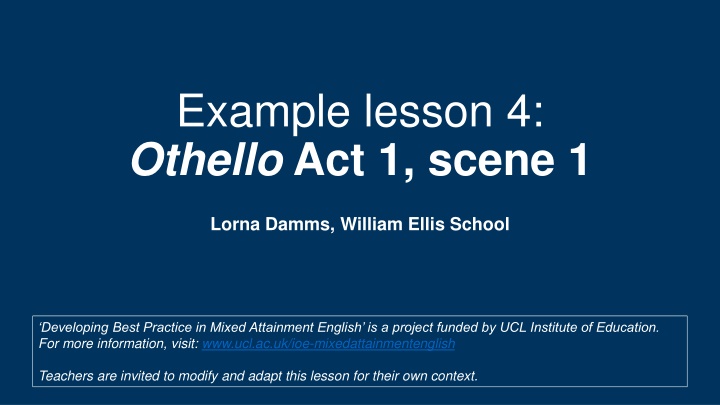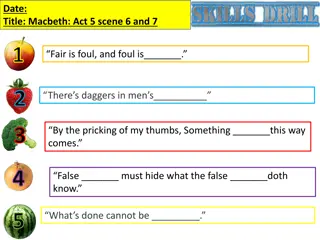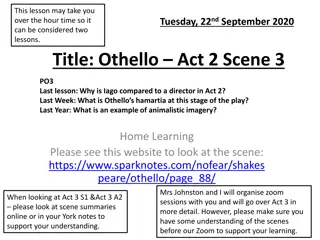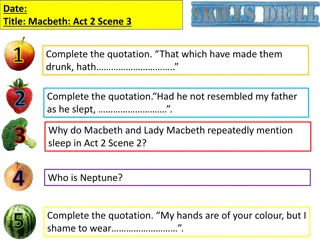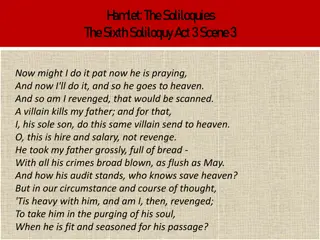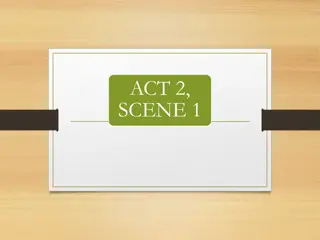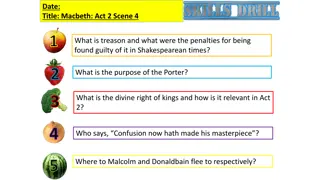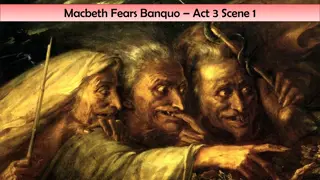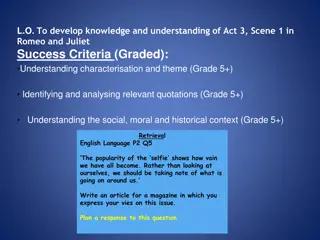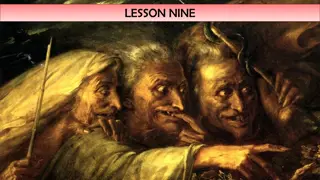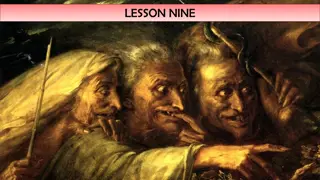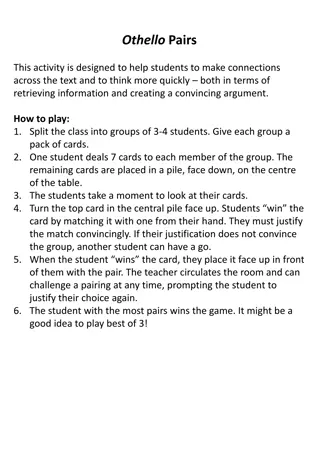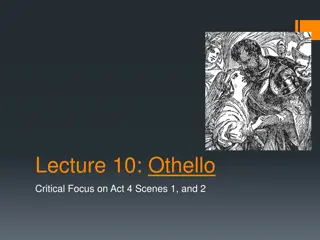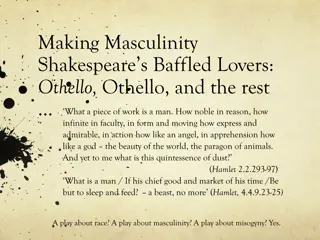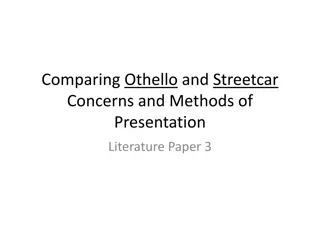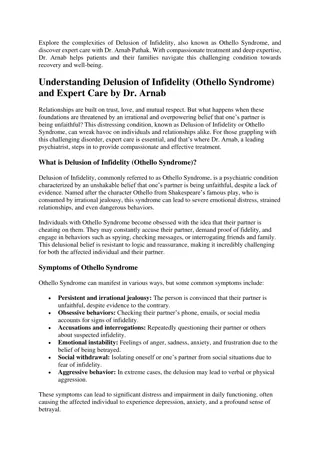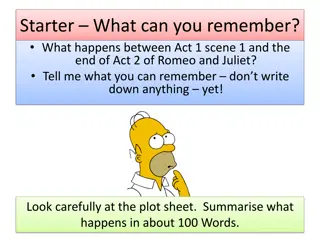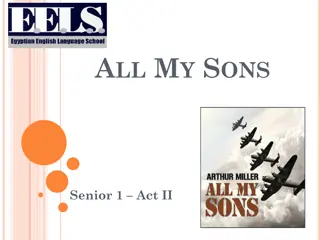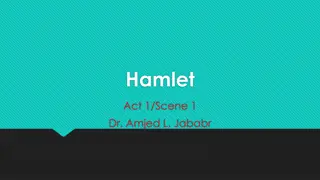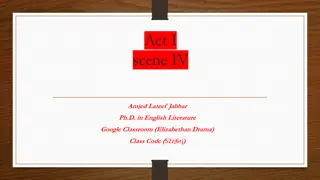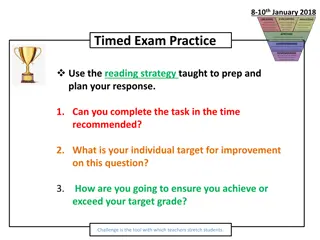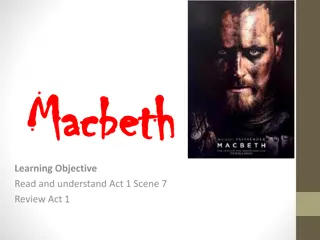Analyzing Key Characters in Othello Act 1 Scene 1
In this lesson, teachers can delve into the opening of Othello Act 1 Scene 1 by exploring the presentation of key characters through interactive improvisation exercises. The students engage in role-playing as Iago and Roderigo, analyzing their emotions, motivations, and interactions. The lesson focuses on developing a deeper understanding of character dynamics and setting the stage for further exploration of the play's themes. Through discussions and performances, students gain insights into character development and the underlying conflicts in the play.
Download Presentation

Please find below an Image/Link to download the presentation.
The content on the website is provided AS IS for your information and personal use only. It may not be sold, licensed, or shared on other websites without obtaining consent from the author.If you encounter any issues during the download, it is possible that the publisher has removed the file from their server.
You are allowed to download the files provided on this website for personal or commercial use, subject to the condition that they are used lawfully. All files are the property of their respective owners.
The content on the website is provided AS IS for your information and personal use only. It may not be sold, licensed, or shared on other websites without obtaining consent from the author.
E N D
Presentation Transcript
Example lesson 4: Othello Act 1, scene 1 Lorna Damms, William Ellis School Developing Best Practice in Mixed Attainment English is a project funded by UCL Institute of Education. For more information, visit: www.ucl.ac.uk/ioe-mixedattainmentenglish www.ucl.ac.uk/ioe-mixedattainmentenglish Teachers are invited to modify and adapt this lesson for their own context.
Act One, Scene One LQ: Can I comment on how key characters are presented in the opening of the play?
Two men meet up on a street 1. One of you is Iago and one of you is Roderigo. Both of you feel you have lost out on something (different things) and are angry. Improvise their conversation.
Two men meet up on a street 2. Now you are going to find out why they feel cheated. Roderigo: You had been keen to win the love of Desdemonabut daren t be too direct, soyou had asked Iago to help you win her. Iagohas spent quite a lot of your money doing this. It hasn t worked. You think Iago has let you down. Iago: You deflect Roderigo s anger by talking about how angry you are about your own disappointment missing out on a promotion from the man you work for. You say three important men even tried to ensure your promotion. Your own anger takes over the conversation. Roderigo: Your complaints trickle away as Iago becomes more and more dominant. Start talking!
Two men meet up on a street 3. Carry on talking! It turns out that there is a common factor: Desdemona has gone off with the very man who has not promoted Iago. You have a common enemy whom you don t name, though you refer to him repeatedly as he and him . Roderigo: You have noticed that Iago is often in close contact with this unnamed man and say a version of this in an accusing way Thou toldst me thou didst hold him in thy hate . Iago: Yourresponse to the accusation of being too close to this man who has disappointed you both should be a version of I follow him to serve my turn upon him .
Two men meet up on a street 4. Consider this new information. Iago and Roderigo: You are white. Your enemy is black. In the light of this new information, re-run a section of your conversation. A version of both the lines quoted below should still be included in your dialogue: Roderigo: Thou toldst me thou didst hold him in thy hate. Iago: I follow him to serve my turn upon him.
The opening dialogues 5. Gathering ideas. After watching three pairs perform, discuss your first impressions in your table groups. Make careful notes: on these ideas: How has Roderigo come across to you? How has Iago come across to you? Neither Iago nor Roderigo has mentioned their enemy s name yet, so what is the effect of their frequent references to him , he , that man , etc.? What do you now expect that man to be like when he first appears on stage?
